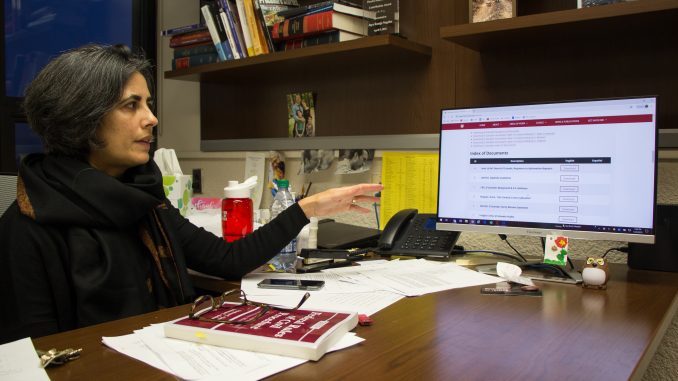
When Jaya Ramji-Nogales attended law school 20 years ago, she knew she wanted to pursue immigration law.
“I’ve always found it really rewarding to work with asylum clients,” Ramji-Nogales, associate dean of students and professor at Beasley School of Law said. “It’s a really important part of who we are as a nation to provide protection to people who are fleeing harms that their government can’t or is not willing to protect them from.”
In collaboration with the Washington Office of Latin America, Ramji-Nogales’ Refugee Law and Policy class is compiling an annotated table of contents, a compilation of articles and resources, about proof of asylum and lawyers who are supporting asylum claims. This semester, they are compiling resources that will benefit small business owners who are fleeing Guatemala, El Salvador and Honduras, Ramji-Nogales said.
There are a variety of reasons someone may apply for asylum in the United States. Asylum seekers must prove in court that their home country is unsafe or that the government is unable or unwilling to protect them, according to the Constitutional Rights Foundation.
WOLA is an advocacy organization that promotes human rights and justice in Central America and it can be accessed by non-governmental lawyers who do not charge their clients, Ramji-Nogales said.
Last year, the organization was looking for a consultant to do research for lawyers on asylum cases. They called Ramji-Nogales, who thought it was the perfect research project for her class, she said.
“It seemed like a nice way for students to be able to step in and to learn very practically the materials that you need to pull together in order to support an asylum claim,” she said. “How you need to structure those materials, how you need to organize and the legal theories that you’re going to be using.”
Maureen Meyer, director for Mexico and migrant rights at WOLA, said a person who doesn’t have a lawyer has less than a 10 percent chance in successfully making an active asylum claim in the United States.
“Access to legal counsel is an essential element to allowing someone to make their argument and get the protection that the people would likely qualify for in the United States,” she said. “So we viewed this as a way to really help the number of asylum seekers that are coming to the United States have the information that they need on their claims based on their conditions in their countries.”
Ramji-Nogales first teaches her students about laws relevant to the topic they are working on in the course and then invites law librarians to inform them about accurate and reliable research.
When the program began, the class focused on state complicity and how it affects women facing domestic violence and harms, members of the LGBTQ community and children, said Ramji-Nogales.
Shannon McGuire, a litigation associate at Saul Ewing Arnstein & Lehr, a nationwide law office, took Ramji-Nogales’ class when she was a student in 2017. She conducted for her group in Spanish, looking at newspaper articles that were useful to cases specific to El Salvador, she said.
The 2019 law alumna was drawn to immigration law because her childhood best friend was undocumented. She said it never crossed her mind until DACA was first being pushed through in 2012 and she realized how much it impacted someone she loved.
“We were exactly the same yet based on where she was born, it totally dictated her opportunities and the difficulty of her life,” she said.
McGuire said she used the annotated table of contents for a pro-bono case she is working on involving an indigenous person who is fleeing their home country of Guatemala.
“There’s different tabs based on the country that you’re in and type of person that you’re representing, and that was extremely helpful because things were already organized and useful quotes were already pulled from 400-page research publications,” she added.
She said she copied the articles and the quotes into her belief, which is the document that argues why the person she is representing requires protection from the United States government.
“I wanted to go to law school to defend those people or at least … give a microphone to their voice,” McGuire added. “Even though people oftentimes don’t listen, a lot of people do and it can impact the way communities sees an experience.”
WOLA focuses on influencing policy, which can be very long term, Meyer said. It has, therefore, been nice to work on a more direct way to help people who are applying for asylum, she added.
“It’s something that is specific and that hopefully is helping a large population of people in need,” she said. “It’s kind of a concrete contribution that we can have to the situation of asylum seekers at our border based on what we do.”


Be the first to comment